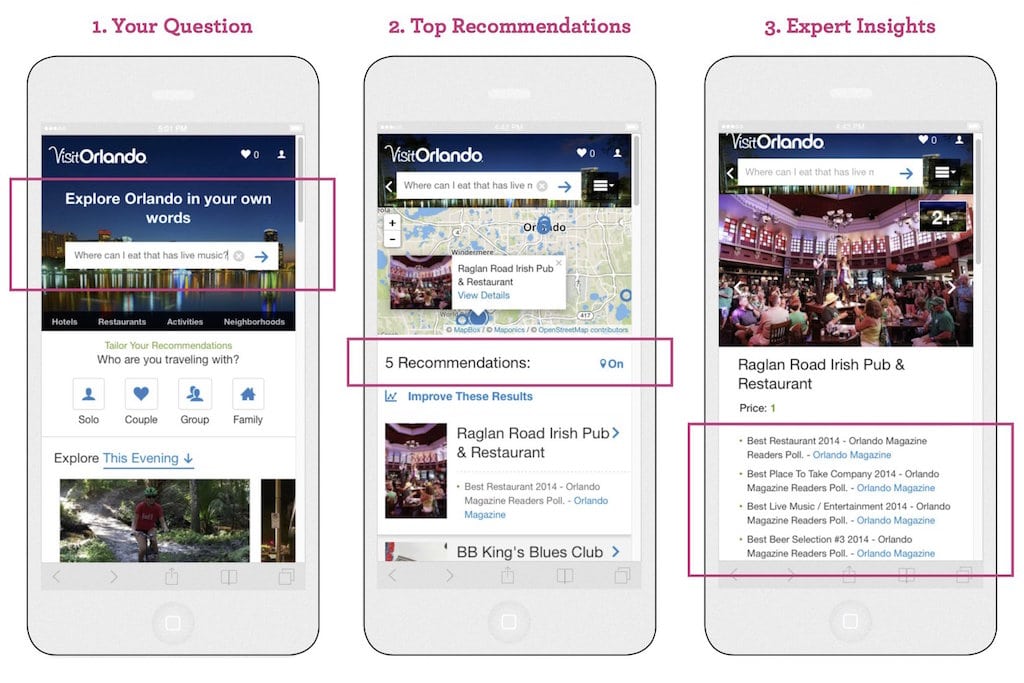Skift Take
Although Visit Orlando's new AI-powered travel app still has kinks, it shows the power of machine learning to provide more contextual and customized information to travelers — most of the time.
The most notable benefit of IBM Watson’s artificial intelligence (AI) in a search engine capacity is its ability to understand concepts rather than just keywords.
For example, search for: “What is the best brunch spot with Southern cooking and craft beer?” on Visit Orlando’s website in the search window, and you’ll get one result: “15 Best Pet Friendly Restaurants in Orlando.”
Use the same search query in the new Watson-powered Visit Orlando app, and you’ll get four considerably more relevant and interesting responses, including the Cask & Larder, Boheme, and Maxine’s on Shine restaurants.
The app uses Austin-based WayBlazer’s software platform that combines Watson’s natural language APIs—tech that lets one software talk to another—with its own proprietary package containing massive amounts of travel data. Watson can understand English but it can’t understand travel until a third-party company like WayBlazer “teaches” it about travel.
“We’ve built a very large travel graph of our own that contains a million hotels, vacation rentals, millions of reviews, 14 million images, and we’re processing all of that data together and mixing it in a recipe depending on what the client wants,” Terry Jones, chairman of WayBlazer, told Skift. “We’re using artificial intelligence and machine learning to improve conversion rates for companies. We want to turn more shoppers into buyers.”
Ostensibly, if people can find more relevant search results through WayBlazer’s Watson-integrated technology, then they’re more likely to purchase more quickly because the information is more customized to their interests.
“Watson is recognized as representing a major advancement in how technology can be used to expand the pursuit of knowledge and expertise,” said Jonas Nwuke, platform manager at IBM Watson. “The travel industry is embracing Watson to help customers customize their travel experiences based on a better understanding of their preferences.“
Unlike Visit Orlando’s website, the app also integrates reviews from TripAdvisor so customers don’t have to leave the app. That again is designed to convert more bookings.
However, AI-powered search is still very much in beta. We searched for: “What is the best luxury hotel?” Only two recommendations appeared: JW Marriott Orlando Grande Lakes and The Mall at Millennia.
“Where is the best nightlife?” provided a slew of cool bars and lounges, so that’s helpful. You can also drill down easily into more specific search tags listed below the results, such as “Reggae Music” or “Night Out.”
It seems like the app is most valuable for people seeking food and beverage, attractions, entertainment, and shopping. The results for every query are also tagged in a Google Map at the top one-third of the screen.
We also searched for: “What is the best conference hotel in Orlando?” The results were filled with Best Westerns and Quality Inns, versus the city’s marquee business hotels.
Jones said the app was developed for the leisure customer, so there isn’t any meetings-specific metadata built into the app to answer those types of queries.
“The interesting thing about this software goes back to when IBM’s people built Watson to beat ‘Jeopardy,'” he explained. “They said when they finished programming it, it was sort of like a four-year-old that was starting to think on its own. So we had to take Watson and train it in travel. We had to take it to school to learn new things, but it hasn’t gone to the class on conference hotels yet.”
Jones added that Visit Orlando will be embedding WayBlazer’s Watson platform into the tourism bureau’s website at a later date.
Skift AI Travel Newsletter
AI coverage across travel sectors that’s focused on separating trendy moves from good ideas – in your inbox every Friday.
Have a confidential tip for Skift? Get in touch
Tags: apps, artificial intelligence, orlando, tourism
Photo credit: The mobile interface of Visit Orlando's new travel app. WayBlazer
